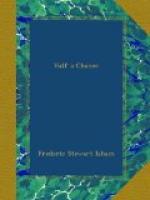To break it open was his next problem, and no easy one, for the boards were thick, the nails many and formidable. A long time he battered and battered in vain with his rocks, but, after an hour or so, he succeeded in splintering his way through the tough pine. His exertions did not end here; an inner sheeting of tin caused him to frown; more furiously he attacked this with sharp bits of coral, cutting and bruising his hands. Unmindful of pain, he was enabled at length to pull back a portion of the protecting metal and reveal the contents of the packing-case. In his befuddled, half-crazed condition, he had thought only of bottles; what he found proved a different sort of merchandise.
Maddened, he tossed and scattered the contents of the box on the beach. The ocean had deceived him, laughed at him, cheated him. He turned from the shore unsteadily, walked back to his camp and knocked the neck from one of the two remaining bottles. A few hours later, sodden, sottish, he lay without motion, face to the sky. And as he breathed thickly, one bleeding hand still holding the empty bottle, a bird from an overhanging branch looked down upon him: a tiny bird, little bigger than his thumb, that carried a bright, beautiful spot of red on its breast, cocked its head questioningly.
* * * * *
PART TWO
CHAPTER I
THE WHEELS OF JUSTICE
London, in the spring! Sunshine; the Thames agleam with silver ripples, singing as it flows; red sails! Joyous London that has emerged from fogs and basks beneath blue skies! Thoroughfares that give forth a glad hum; wheels singing, too; whips that crack in sprightly arpeggios. On the streets, people, not shadows, who walk with a swing; who really seem to breath and not slink uncannily by! Eyes that regard you with human expression; faces that seem capable of emotion; figures adorned in keeping with the bright realities of the moment. London; old London young again; grimy, repulsive London now bright, shimmering, beautiful!
In such a London, on such a day, about ten o’clock in the morning, three persons whose appearance distinguished them from the ordinary passers-by, turned into a narrow thoroughfare not far from the Strand.
“Quite worth while going to hear John Steele conduct for his client, I assure you!” observed one, a tall, military-looking man, who walked with a slight limp and carried a cane. “He’s a new man, but he’s making his mark. When he asked to be admitted to the English bar, he surprised even his examiners. His summing-up in the Doughertie murder case was, I heard his lordship remark, one of the most masterly efforts he ever listened to. Just tore the circumstantial evidence to pieces and freed his man! Besides his profession at the bar, he is an unusually gifted criminologist; takes a strong personal interest in the lowest riffraff; is writing a book, I understand—one of the kind that will throw a new light on the subject.”




